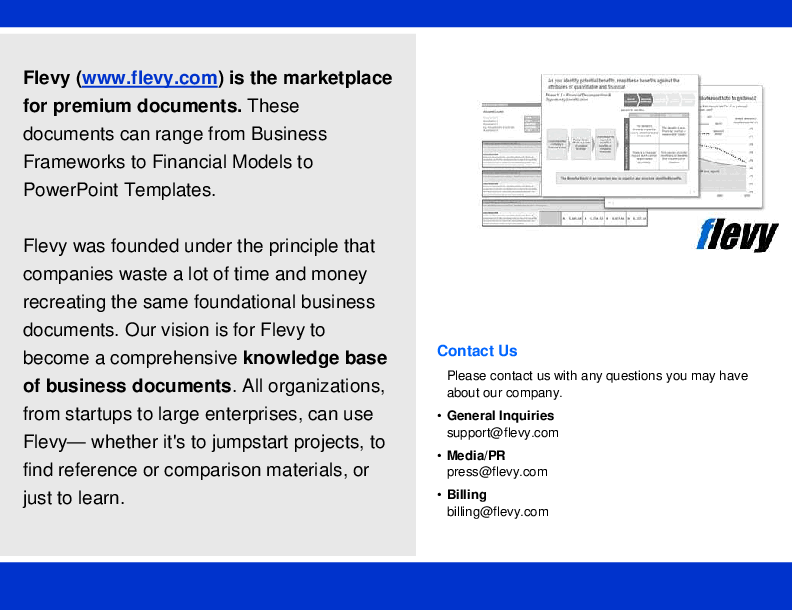Lean Enterprise Best Practice Roadmap (PDF)
PDF document + supplemental PDF 17 Pages
BENEFITS OF THIS PDF DOCUMENT
- Provides a roadmap to drive maximum Lean success with minimal risk.
LEAN PDF DESCRIPTION
Why is it with Lean being a proven Best Practice, that over 50% of businesses fail with Lean? Ample evidence shows that Lean Businesses outperform; note the dramatic outperformance of two leading lean businesses Toyota and Danaher, as measured by share price appreciation, driven by Lean culture and continuous improvement in innovation, service levels and productivity.
Within this Lean Roadmap, three key questions are addressed: 1) What is Lean?, 2) Why do businesses fail with Lean? 3) What is a best practice roadmap to Lean sustainable success?
The Roadmap integrates all critical elements of lean with the appropriate balance of simplification with focus on the critical elements in this 17 page white paper.
1) What is Lean?
Lean is a comprehensive, fully integrated Business System across Leadership, Culture, Process and Systems that eliminates "waste" and drives superior & predictable process performance, thus 1) Dramatically reducing time spent firefighting, 2) Increasing available time to focus on Continuous Improvement, Strategy and Innovation. Lean is well proven for not just manufacturing but all enterprise processes (Manufacturing, Service and Transactional) that provide a customer focused product or service.
2) Why do businesses fail with Lean?
Three key observed causals include: 1) Top Leadership lacks Lean Vision, Ownership and Engagement, 2) Insufficient "People First" focus – Lean is done "to" vs. "with and for" the people, and 3) Deployment scope limited to a few "projects" vs. Strategy Deployment driven pursuit of perfection. Too often, Lean is delegated as a Manufacturing initiative, precluding critical Lean prerequisites and full support. There are two types of Executive Leaders: those that buy-in to Lean and those that don't. Top Leadership at Toyota and Danaher could not envision leading without lean. The risk of not embracing Lean far exceeds the risk of a Lean transformation.
Consider a case whereby a Plant Manager of a large plant championed a Lean initiative without engaging upper Leadership or critical functions such as Plant Scheduling, Supply Chain, R&D or Sales. Lean had moderate success due to: 1) Plant Leadership support, 2) Plant level Change Management which transitioned culture very positively to Total Associate Engagement, 3) robust Lean Business System development, and 4) successful Lean Foundational deployment including WPO Work Place Organization (6S and Visual Management), PSW Process Standard Work, LSW Leader Standard Work, and DPM Daily Performance Management. Throughput improved 35% and quality and productivity also improved dramatically. However due to lack of cross functional support, the Lean Program stalled with the Foundation and could not progress to the really powerful elements of Flow, Pull and Enterprise Lean. Roadblocks arose with Staffing, Material, Equipment, Product and Process Design and Scheduling, which should have been prevented or resolved sooner with full engagement, enabling even greater business performance improvement. Thus, it is essential for maximum value and sustainable success that Lean 1) start with Top Leadership, 2) address the entire organization in Lean change management, and 3) deploy comprehensive Lean Manufacturing & Enterprise to achieve customer driven workflow for all processes.
3) What is a best practice roadmap to Lean sustainable success? How and where do we start?
1. Engage Top Leadership for Vision, Commitment and engagement.
2. Embrace robust Change Management to communicate, empower and engage the entire Organization to sustain Lean in the Culture "by" the worforce (not "to" the workforce).
3. Start simple with Lean Foundation. Stabilize performance, map Value Streams, organize workplace, implement daily controls and standardize process work.
4. Create Manufacturing Flow: Dramatically reduce lead times through footprint relayout, level schedule, kanban, and Constraint OEE improvement using SMED, TPM and other lean processes.
5. Aggressively deploy Lean process across the enterprise to stamp out waste.
Got a question about the product? Email us at support@flevy.com or ask the author directly by using the "Ask the Author a Question" form. If you cannot view the preview above this document description, go here to view the large preview instead.
Source: Best Practices in Lean PDF: Lean Enterprise Best Practice Roadmap PDF (PDF) Document, FRC Group - Focused Results Consulting







